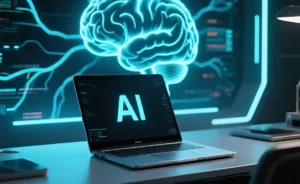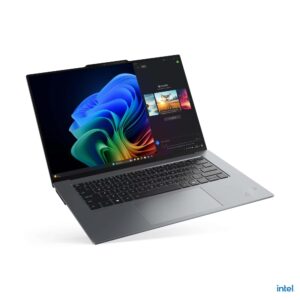Quantum computing may sound like science fiction, but its potential to revolutionize technology is very real. Unlike classical computing, which processes information using bits as 0s and 1s, quantum computing leverages the strange and exciting principles of quantum mechanics — like superposition and entanglement — to perform calculations at speeds previously thought impossible. This unprecedented power isn’t just about tackling complex simulations or advancing artificial intelligence; it rewrites the rulebook of what’s achievable with computing.
Today’s laptops, remarkable as they are, face increasing limitations. From slowing advances in processor speeds to significant challenges with energy efficiency and heat management, classical computers are showing signs of strain. Despite incremental improvements in design and capability, the fundamental architecture of classical computing puts a ceiling on just how much more can be achieved. This is where quantum computing steps in, promising a future where these bottlenecks become relics of the past.
But what does this mean for the everyday laptop? Imagine a device that could execute advanced computations in seconds, perceive patterns hidden in massive datasets, or run resource-heavy applications on minimal power. How could quantum technology, paired with portable consumer devices, truly redefine how we work, connect, and innovate? This article explores the possibilities and challenges of bringing quantum power into the laptops we rely on every day.
What is Quantum Computing?
Quantum computing is an advanced and revolutionary field of computing that operates differently from traditional, or classical, computing. Unlike classical computers, which rely on bits to process data as either 0s or 1s, quantum computers leverage quantum bits, or qubits. Qubits have the extraordinary ability to exist in multiple states simultaneously, thanks to principles from quantum mechanics such as superposition and entanglement.
Qubits and Superposition
A classical bit can be in one of two states—0 or 1—at any given time. Qubits, however, can exist in a blend of 0 and 1 at the same time, thanks to the concept of superposition. To simplify, imagine spinning a coin on a table instead of having it land as heads or tails. While the coin spins, it effectively represents both possibilities at once. This property allows quantum computers to process a vast amount of data simultaneously, making them exponentially more powerful for certain tasks.
Entanglement
Another key feature of quantum computing is entanglement. When two qubits become entangled, the state of one qubit is directly linked to the state of another, no matter how far apart they are from each other. Changing the state of one qubit will instantly change the state of the other. This interconnectedness enables quantum computers to perform computations in ways that are impossible for classical systems, greatly enhancing their processing capabilities.
How Quantum Computing Differs from Classical Computing
Classical computers follow a binary logic system, solving problems in a step-by-step manner. While they are highly effective for most current applications, they face limitations when solving problems that involve massive amounts of data or require significant computational power, such as climate modeling, genetic analysis, or financial forecasting.
Quantum computers, by contrast, excel at solving problems with complex structures because they can explore numerous solutions at once. For instance:
- They can run intricate simulations of molecular structures to revolutionize drug discovery.
- They can process massive datasets quickly to find hidden patterns or insights.
- They can optimize logistical operations like supply chains or urban planning far more efficiently.
Why Quantum Computing is More Powerful
The unique properties of qubits unlock capabilities far beyond classical computing. Quantum computers can solve certain types of problems exponentially faster than even the most advanced classical supercomputers. For instance, cracking encryption algorithms that would take a classical computer thousands of years could potentially be done in mere minutes by a quantum computer.
However, it’s important to note that quantum computing is not a replacement for classical systems. Classical computers will remain indispensable for everyday functions like word processing, browsing, and gaming. Quantum computers, on the other hand, are best suited for highly specialized and complex tasks.
Making Complexity Understandable
On a practical level, quantum computing might feel like the distant cousin of everyday technology, but its influence is migrating closer to devices we rely on daily. Understanding core concepts—like superposition, entanglement, and qubits—helps us appreciate just how quantum advancements could eventually reshape the laptops and systems we use, making what seems incredibly complex now, remarkably commonplace in the future.
The Current Landscape of Laptop Technology
Modern laptops have come a long way, evolving into powerful and versatile tools that millions of people rely on every day for work, communication, entertainment, and more. Their capabilities are impressive by classical computing standards, but these advancements also come with inherent challenges as the limits of traditional technology become increasingly apparent.
Current Capabilities of Laptops
- Processing Power
Today’s laptops are equipped with multi-core processors capable of handling complex tasks such as video editing, gaming, and real-time data analysis. Advances in microprocessor technology have enabled laptops to pack significant computational power into a portable frame, making them indispensable in both professional and personal contexts.
- Storage
The shift from hard disk drives (HDDs) to solid-state drives (SSDs) has revolutionized storage in laptops. SSDs are faster and more reliable, allowing for quick data retrieval and improving system performance significantly. Current laptops offer extensive storage options ranging from 256 GB to several terabytes, catering to both everyday users and professionals managing large datasets.
- Energy Efficiency
Modern laptops are far more energy-efficient than their predecessors, with low-power processors and optimized performance settings extending battery life. Many laptops can now run for over 10 hours on a single charge, ensuring productivity on the go.
Challenges Faced by Classical Laptops
Despite their capabilities, laptops adhering to classical computing principles are reaching natural limits, and the following challenges highlight the need for a breakthrough in computing technology:
- The Slowing of Moore’s Law
Traditionally, Moore’s Law predicted a doubling of transistors on a chip roughly every two years, which fueled exponential growth in computing power. However, as manufacturers push the boundaries of silicon-based technology, physical and economic limitations have begun to slow this trend. Smaller transistors generate more heat and require greater precision, making further miniaturization increasingly difficult and expensive.
- Heat Generation
High-performance laptops often struggle with heat management. Intensive processes, such as gaming or 3D rendering, cause processors and graphics chips to generate significant heat, necessitating elaborate cooling systems. These cooling solutions sometimes add bulk to laptops, detracting from their portable appeal.
- Power Consumption
While energy-efficient processors are improving the situation, today’s laptops often require considerable power, especially for demanding tasks. This reliance on power can lead to shorter device lifespans, frequent charging, and frustration for users who rely on their laptops for extended periods without access to power outlets.
Looking Ahead
The challenges facing classical laptops underline the potential of quantum computing to redefine the landscape of portable consumer technology. By exploring entirely new principles of computation, quantum advances could overcome limitations like Moore’s Law, tackle heat generation issues, and drastically enhance energy efficiency. Understanding the state of current laptops today places us on the threshold of discovering how the revolutionary principles of quantum mechanics might redefine the devices we use tomorrow.
Potential Impacts of Quantum Computing on Laptops
a. Processing Power
Quantum computing has the potential to revolutionize processing power in ways classical laptops could only dream of. Traditional processors operate sequentially, carrying out one calculation at a time at incredible speeds. Quantum computers, however, utilize the principles of superposition and entanglement, allowing them to process multiple calculations simultaneously. When integrated into laptops, this could lead to an exponential leap in speed and efficiency.
This boost isn’t just theoretical. Tasks that require high computational resources, such as training artificial intelligence models, running complex simulations, or performing real-time data analysis, stand to benefit immensely. For instance:
- Artificial Intelligence (AI): Quantum-enabled laptops could process and optimize AI algorithms in record time, paving the way for more advanced and responsive AI-driven technologies.
- Simulations: Engineers and scientists could run intricate simulations of natural phenomena, such as weather patterns or molecular behavior, directly on portable devices.
- Big Data Analysis: Quantum laptops could sift through vast datasets in seconds, uncovering trends and insights that classical computers would take hours—or even days—to process.
This type of processing power could enable businesses, scientists, and everyday users to tackle problems that are currently impractical with classical computing.
b. Energy Efficiency
Current laptops frequently balance performance with energy consumption, often forcing users to choose between powering through intense tasks or conserving their battery. Quantum computing could eliminate this tradeoff. By leveraging qubits’ ability to process data in parallel, quantum laptops could execute complex computations using far less energy than classical processors.
The implications for battery life and sustainability are significant:
- Extended Battery Life: A quantum-enabled laptop might run for days on a single charge, even during heavy use, redefining portability and convenience.
- Sustainability: Reduced energy consumption aligns with the global push toward more environmentally friendly technology. Quantum computing hardware could support eco-friendly designs that rely less on resource-intensive components.
The energy savings also extend beyond individual devices. Widespread adoption of quantum laptops could reduce the demand for high-energy-consuming data centers, effectively cutting down on global energy use.
c. Data Security
One of the most immediate and profound impacts of quantum computing on laptops will lie in the domain of data security. Quantum encryption, which relies on the unique properties of quantum mechanics, is virtually uncrackable using classical computers. With quantum encryption integrated directly into laptops, users could enjoy unprecedented levels of data protection.
However, the same technology poses significant risks. Quantum computers are capable of breaking classical encryption methods, which form the backbone of today’s digital security. Any quantum-enabled laptop could theoretically render traditional security obsolete, exposing sensitive information and necessitating urgent updates to global security protocols.
This dual-edged sword means quantum laptops will not only need to integrate advanced encryption systems but also function within a reimagined cybersecurity framework that protects against their disruptive potential.
d. Software and Applications
The leap to quantum computing will necessitate a corresponding evolution in software. Classical software cannot harness the unique capabilities of quantum processors, so quantum laptops will require tools and programs specifically optimized to operate in this environment.
The shift opens the door to groundbreaking new applications:
- Medicine: Quantum-based applications could simulate complex biological systems, speeding up drug discovery and personalizing medical treatments.
- Finance: Real-time risk assessments and portfolio optimizations could become more precise and instantaneous with the elaborate calculations quantum laptops could handle.
- Gaming: For gamers, quantum technology could mean immersive simulations with unprecedented levels of detail and realism, all powered by quantum-optimized game engines.
The challenge will be creating accessible, user-friendly software that bridges the gap between cutting-edge hardware and everyday use. Developers will need to rethink systems and frameworks from the ground up to fully utilize the quantum level of performance.
Looking Ahead
The potential impacts of quantum computing on laptops are vast and multifaceted, promising to elevate processing power, energy efficiency, data security, and software possibilities to new heights. While challenges remain in developing hardware, software, and security solutions that can handle this transition, the transformative effects on how we use portable devices could prove to be one of the most profound shifts in computing history.
Challenges in Bringing Quantum Computing to Laptops
The idea of having quantum-powered laptops at our fingertips is undeniably exciting. However, the path to making such advanced technology accessible and practical is fraught with significant challenges. From hardware and size constraints to the costs of development and the complexities of integration with classical systems, several hurdles must be addressed before quantum computing can find its way into everyday devices. Let’s take a closer look at some of these challenges.
1. Size and Hardware Limitations
One of the most significant obstacles to bringing quantum computing to laptops is the sheer size and sensitivity of current quantum computers. Today’s quantum machines are enormous, often filling an entire room, and require highly controlled environments to function properly. Core components, such as qubits, are incredibly delicate and need to be maintained at temperatures near absolute zero (approximately -273°C). This extreme cooling is achieved using cryogenic systems, which are anything but portable.
The challenge lies in miniaturizing this technology while maintaining its functionality:
- Cooling Systems: Developing cooling mechanisms compact enough for a laptop while still capable of supporting qubit stability is a major technological hurdle.
- Material Innovations: Researchers are exploring new materials and designs to create qubits that are less fragile and operate efficiently at higher (and less extreme) temperatures.
- Durability and Portability: Making hardware that can withstand everyday bumps and vibrations without compromising performance is critical for consumer devices.
While advancements are being made, technology has a long way to go before quantum computing hardware becomes small, stable, and robust enough for laptops.
2. Cost and Accessibility
Another major barrier to quantum laptops is cost. Building and maintaining even a basic quantum system today is prohibitively expensive, with some systems costing millions of dollars. The expense stems from:
- Specialized equipment required for quantum operations.
- The complexity of manufacturing ultra-precise components like qubits and cryogenic systems.
- The extensive research and development efforts needed to improve the technology.
Making quantum laptops affordable for everyday users will demand groundbreaking innovations in manufacturing and economies of scale. Companies will need to find ways to mass-produce quantum components at lower cost while ensuring reliability. Until then, quantum computing will likely remain confined to research labs, corporations, and niche industries rather than being widely accessible.
3. Integration with Classical Systems
Quantum computers operate fundamentally differently from classical computers. While classical laptops rely on binary systems (0s and 1s), quantum systems use qubits, which can exist in multiple states simultaneously. This profound difference presents significant challenges in blending the two technologies into functional, hybrid systems that consumers can use.
Key issues include:
- Hybrid Models: For the foreseeable future, quantum laptops are likely to function as hybrid devices, combining classical and quantum processors. Designing systems that allow seamless collaboration between these two architectures will be complex.
- Software Compatibility: Existing software is built for classical computing models. Developers will need to create entirely new frameworks and quantum-optimized applications while ensuring compatibility with existing programs.
- User Interface Challenges: To reach non-expert consumers, quantum laptops will require intuitive interfaces. Bridging the gap between highly complex quantum operations and user-friendly designs will be a significant undertaking.
Looking at the Road Ahead
While the challenges in bringing quantum computing to laptops are daunting, they are not insurmountable. Ongoing advancements in hardware miniaturization, cost efficiency, and system integration are pushing the technology closer to consumer-ready devices. However, solving these issues will require concerted efforts across industries, from materials science to software engineering, as well as significant financial investment and innovative breakthroughs.
Timeline: How Far Are We from Quantum Laptops?
Quantum computing is no longer a theoretical concept confined to physics labs. Today, it is a rapidly evolving field poised to reshape industries and everyday technology. But just how close are we to seeing quantum computing power make its way into the laptops we use daily? By examining the current state of research, identifying the key players driving innovation, and projecting future developments, we can start to piece together a realistic timeline for quantum laptops.
Current Progress in Quantum Computing Research
The last decade has seen incredible breakthroughs in quantum computing, particularly in improving the stability and reliability of qubits—the core units of quantum processors. Researchers have focused on addressing two main challenges:
- Error Rates: Quantum systems are notoriously prone to errors due to environmental interference. Advances in quantum error correction have significantly improved calculation accuracy, although more progress is needed to achieve fault-tolerant quantum computing.
- Scalability: Most current quantum systems operate with tens to hundreds of qubits. Researchers aim to scale to thousands or even millions of qubits while maintaining stability and performance.
Recent milestones include:
- Quantum Supremacy Achieved: Google’s achievement of quantum supremacy in 2019 showcased how its 54-qubit Sycamore processor could solve a specific problem exponentially faster than the most powerful classical supercomputers.
- Advances in Materials Science: Development of more robust qubit architectures, such as topological qubits or silicon-based qubits, is paving the way for more stable and practical hardware.
- Hybrid Models: Progress in hybrid quantum-classical computing demonstrates how the two systems can work together, potentially forming the basis of early quantum laptops.
With these advancements, the foundation is being laid for smaller, more practical quantum systems that could one day fit into consumer devices.
Companies and Organizations Leading the Charge
A number of tech giants and research organizations are spearheading the quantum computing revolution, each taking unique approaches to make quantum technology mainstream. Here are a few key players and their contributions:
- IBM: IBM leads the field with its Quantum Experience, a cloud-based platform that allows users to experiment with quantum computing. Its roadmap includes plans to build a 100,000-qubit quantum system within the next decade, a significant leap from its current 433-qubit processors.
- Google: Google’s quantum team is focused on scaling its quantum systems and has already demonstrated the capability of solving computations beyond the reach of classical systems. Its Sycamore processor continues to be a benchmark for quantum advancements.
- Intel: Intel is pursuing semiconductor-based quantum computing, leveraging its expertise in microchip manufacturing to create scalable, silicon-based quantum processors.
- Other Contenders: Smaller companies like Rigetti Computing and startup IonQ are also making waves, with strides in both hardware and software solutions. Partnerships between these firms and global universities have been instrumental in pushing the boundaries of quantum research.
Predictions for Quantum Laptops
While the development of compact quantum laptops remains a long-term goal, realistic forecasts suggest they could be achievable within the next few decades. Here’s how the timeline might unfold:
- Short Term (2025-2030): The immediate focus will remain on creating moderately scaled quantum systems housed in controlled environments. Hybrid quantum-classical setups, accessible through external cloud computing platforms, will likely see continued expansion, offering users indirect access to quantum capabilities from classical laptops.
- Medium Term (2030-2040): Over the next 10 to 15 years, as quantum hardware becomes more compact and affordable, we could witness the integration of limited quantum capabilities into high-performance laptops. These devices would feature specialized quantum coprocessors designed for specific tasks, such as simulations or encryption.
- Long Term (2040 and Beyond): Fully functional quantum laptops—portable devices capable of running true quantum algorithms alongside classical tasks—are unlikely to materialize until the 2040s or later. By this point, advancements in qubit design, energy efficiency, and software ecosystems could make quantum laptops viable for commercial use.
The Road Ahead
Although it may be years, or even decades, before quantum laptops become a reality, the progress being made today lays the groundwork for future breakthroughs. Continued investment in research, collaboration between industry leaders, and innovations in hardware and software will determine how quickly these devices reach consumers. Until then, the vision of a quantum-powered laptop sits firmly on the horizon, tantalizingly just out of reach.
Conclusion
Quantum computing has the power to fundamentally change what we expect from laptops. By unlocking unprecedented levels of processing power, these devices could revolutionize how we tackle complex problems, from running resource-heavy AI algorithms to analyzing massive datasets with ease. Their promise of vastly improved energy efficiency could lead to laptops that last days on a single charge, making them both more convenient and environmentally sustainable. With quantum encryption, data security could reach new heights, all while opening the door to groundbreaking software applications in fields like medicine, finance, and gaming.
However, while the potential is immense, the road to consumer-ready quantum laptops is filled with challenges. The hardware remains bulky and dependent on extreme operating conditions, costs are prohibitively high, and integrating quantum processors with classical systems poses significant technical hurdles. Overcoming these obstacles will require years of innovation, collaboration, and investment.
Still, imagining a world powered by quantum laptops is nothing short of inspiring. These devices could redefine the way we solve problems, communicate, and innovate—blurring the line between what’s possible and what’s not. Though it may take decades, the vision of portable quantum-powered technology invites us to dream bigger, creating a future where work, learning, and creativity rise to heights once thought unimaginable.

J.S. is the owner, content creator, and editor at Upgrades-and-Options.com. I’ve worked in the IT and Computer Support field for over 20 years. The server hardware in my computer labs has mostly been IBM, but I’ve supported Dell, HP, and various other hardware. In addition, as part of my lab administrator responsibilities, I’ve learned, supported, and repaired/upgraded network hardware such as Cisco routers and switches. READ FULL BIO >>
- Best Laptops for AI and Machine Learning
 Discover the top 5 laptops for AI and Machine Learning. We review high-performance machines perfect for deep learning, data science, and neural networks. Artificial Intelligence (AI) and Machine Learning (ML) are no longer futuristic concepts—they are the tools shaping our daily lives right now. From developing complex neural networks to training large language models (LLMs)… Read more: Best Laptops for AI and Machine Learning
Discover the top 5 laptops for AI and Machine Learning. We review high-performance machines perfect for deep learning, data science, and neural networks. Artificial Intelligence (AI) and Machine Learning (ML) are no longer futuristic concepts—they are the tools shaping our daily lives right now. From developing complex neural networks to training large language models (LLMs)… Read more: Best Laptops for AI and Machine Learning - Upgrading SSD Storage in the ThinkPad X9-15 Gen 1 Aura Edition
 Upgrading SSD Storage and Analyzing Memory in the ThinkPad X9-15 Gen 1 Aura Edition Upgrade Your ThinkPad X9-15 SSD Like a Pro: A Technical Guide The ThinkPad X9-15 Gen 1 Aura Edition (Machine Types 21Q6 and 21Q7) is designed as a premium device. While memory is permanently fixed, users can easily expand storage capacity, as… Read more: Upgrading SSD Storage in the ThinkPad X9-15 Gen 1 Aura Edition
Upgrading SSD Storage and Analyzing Memory in the ThinkPad X9-15 Gen 1 Aura Edition Upgrade Your ThinkPad X9-15 SSD Like a Pro: A Technical Guide The ThinkPad X9-15 Gen 1 Aura Edition (Machine Types 21Q6 and 21Q7) is designed as a premium device. While memory is permanently fixed, users can easily expand storage capacity, as… Read more: Upgrading SSD Storage in the ThinkPad X9-15 Gen 1 Aura Edition - How Quantum Computing Could Impact Everyday Laptops
 Quantum computing may sound like science fiction, but its potential to revolutionize technology is very real. Unlike classical computing, which processes information using bits as 0s and 1s, quantum computing leverages the strange and exciting principles of quantum mechanics — like superposition and entanglement — to perform calculations at speeds previously thought impossible. This unprecedented… Read more: How Quantum Computing Could Impact Everyday Laptops
Quantum computing may sound like science fiction, but its potential to revolutionize technology is very real. Unlike classical computing, which processes information using bits as 0s and 1s, quantum computing leverages the strange and exciting principles of quantum mechanics — like superposition and entanglement — to perform calculations at speeds previously thought impossible. This unprecedented… Read more: How Quantum Computing Could Impact Everyday Laptops - What Is The Difference Between Lenovo’s Pens? (with Part Numbers)
 Do you ever find yourself writing with an old-school pen or even worse a pencil? As you pry your fingers off that last-century writing device, ask yourself if there isn’t a better way. Well ask no more, there is a whole world of digital pens out there just waiting for you to discover.I went through… Read more: What Is The Difference Between Lenovo’s Pens? (with Part Numbers)
Do you ever find yourself writing with an old-school pen or even worse a pencil? As you pry your fingers off that last-century writing device, ask yourself if there isn’t a better way. Well ask no more, there is a whole world of digital pens out there just waiting for you to discover.I went through… Read more: What Is The Difference Between Lenovo’s Pens? (with Part Numbers) - Legion 5 Laptop Upgrade Guide: Game Like a Pro
 This article serves as your ultimate guide to upgrading your Lenovo Legion 5 laptop with RAM and SSD, unlocking its potential to deliver unbeatable gaming performance. With over two decades of expertise in the tech industry and countless successful upgrade projects under my belt, I’ve distilled all my knowledge into this comprehensive guide. You’ll learn,… Read more: Legion 5 Laptop Upgrade Guide: Game Like a Pro
This article serves as your ultimate guide to upgrading your Lenovo Legion 5 laptop with RAM and SSD, unlocking its potential to deliver unbeatable gaming performance. With over two decades of expertise in the tech industry and countless successful upgrade projects under my belt, I’ve distilled all my knowledge into this comprehensive guide. You’ll learn,… Read more: Legion 5 Laptop Upgrade Guide: Game Like a Pro


